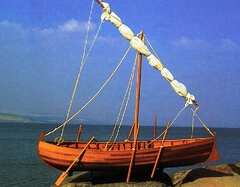
Dubbed The Jesus Boat, the 27-foot wooden fishing boat was discovered by two brothers in 1986 in the Sea of Galilee after a drought. The vessel, dated to the first century, was preserved and put on display at the Yigal Allon Museum in Israel.
The boat is now being popularized in the U.S. through a book, documentary and series of church events, including one tonight at Calvary Chapel in Tucson, Ariz. A replica of The Jesus Boat is also on display at the Holy Land Experience in Orlando, Fla.
“In every way this was a very special discovery-and a magic one,” said marine archaeologist Kurt Raveh, who helped recover and preserve The Jesus Boat and will speak tonight at Calvary Chapel Tucson. “Not because she’s the most significant scientific [discovery], not because it’s the most beautiful [boat] that we discovered so far from the ancient days. … I would say it’s got an emotional cargo more than an actual one.”
(Watch Raveh speak in Tucson live tonight, or view his Jesus Boat talk at Calvary Chapel Albuquerque July 1.)
Although no one knows whether Jesus or His disciples ever used the boat, Christians helping promote The Jesus Boat believe it can “stir the imagination” and “inspire the faith of people.”
“We believe that The Jesus Boat can serve as a touch point,” said Don Stillman, a Christian marketing executive who partnered with the owners of Yigal Allon to found The Jesus Boat initiative. “We hope that it might set off a spark in their spirit to delve deeper into the origins and tenets of their faith.”
The boat was discovered during a four-year drought in Israel that made the boat more accessible. “That morning when we went out to the Sea of Galilee and we saw the remains of the boat … we were dancing like Indians from happiness,” Raveh said. “And then we got a message from heaven. The rain starts pouring out from the sky after a four-year drought, and then came this double rainbow exactly to this place.
“From that moment, everything that was connected to the boat, everything we did, we knew this was the big thing in our lives. We knew this … would change our lives for the good or for the bad. This was a special boat.”
Raveh said preserving the boat, which had been buried in mud for 2,000 years, should have been a “mission impossible.”
“To take a boat out of the mud that can’t hold its own weight, which is actually like wet [cardboard],” he said. “It’s a race against time because as soon as it dries out, it collapses; if you touch it, it collapses. Then you have to extradite it from the mud.”
The archaeologists covered the boat in a preserving foam in order to transport it and sailed across the Galilee river. Goldfish were used to remove dangerous parasites that could have destroyed the boat’s brittle wood. The vessel was preserved in chemical baths for 14 years before it could be displayed in the open air.
Based on its construction, scholars believe the boat was built between 100 B.C and A.D. 100. Scientists don’t know if Jesus sailed on the vessel, but it represents the kind of boats the people of His day would have used.
Since the boat’s discovery, Pope John Paul II has viewed the vessel, along with thousands of tourists to Israel.
Stillman said that while the string of remarkable events surrounding the boat’s survival and discovery had led some to believe it may have been one in which Jesus sailed, it was being presented as “an affirmation of faith, not an icon to be worshiped.”
Chip Lusko, a staff pastor at Calvary Chapel of Albuquerque, N.M., and producer of The Jesus Boat documentary, agreed. “We walk by faith not by sight, but still there’s a part of us that does like to have something tangible,” he told Charisma. “This is not a holy relic … but frankly it’s nice to see something physical from the time of Jesus. It just complements our faith, it doesn’t create it.”
In The Jesus Boat documentary, Lusko parallels the boat’s survival with the preservation of the nation of Israel. “We try to dovetail the story between the fact that the boat was found just yards away from a meeting that took place … to begin strategizing for the independence of Israel in 1945,” Lusko said. “Here Israel was buried for 2,000 years and so was the boat, so it made for some unique storytelling.”
Leaders at the Holy Land Experience said the replica of the boat on display at the Christian theme park is helping paint a picture of life in Jesus’ day.
“It seemed to be a good fit for us here at the Holy Land, where visitors coming here can see this replica of a boat that was discovered from the time of Christ,” said Mike Everett, on-site director of the Holy Land Experience, which is owned by Trinity Broadcasting Network. “It’s become kind of an interesting, important feature here at the Holy Land, another example of what the ancient city of Jerusalem might have been like.”
The book and documentary will be followed by other resources that will include small-group materials and other products related to Israel and Christianity’s Jewish roots, Stillman said.












































